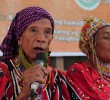By the Policy Study, Publication, and Advocacy
Center for People Empowerment in Governance
Like the flock of presidential aspirants, Mrs. Gloria M. Arroyo will spend the rest of her presidential term removing all impediments to her bid to stay in office beyond June 2010.
The knots to this grand design are quite clear: They can be seen in the President’s frequent provincial forays, orchestrated moves by her allies in Congress, new appointments to her Cabinet, the armed forces, and even the Supreme Court, the recent merger of Kampi and Lakas-CMD, and an election scheme. All these point to the fact that Arroyo’s plan to stay in power is not hers alone to pursue but smacks of a grand conspiracy involving her allies in Congress, Cabinet secretaries, key LGU officials, and others. The success of the strategy rests on Arroyo’s ability to command significant loyalty from elements she has maintained through patronage all these years – as well as logistical support and her allies’ own cunning maneuvers.
By far the clearest sign radiates from some Cabinet secretaries, Mrs. Arroyo’s election lawyer, and local executives in Central Luzon – the traditional bailiwick of the Macapagals. Former Justice Secretary Raul Gonzalez, now the presidential legal counsel, last week confirmed that Mrs. Arroyo will run for a congressional seat in Pampanga for her �self-preservation,� a claim echoed by the agrarian secretary, a press undersecretary, and local politicians in Central Luzon. Mrs. Arroyo has visited Pampanga, her home province, 17 times this year. She hinted as early as 2007 about her plan to run for a seat in Congress.
The President’s election advisers can cite the Fair Election Act of 2001 (RA 9006), particularly Section 14 which deems a candidate running for presidency not resigned from his/her elective position. This section is claimed to have been inserted by stealth but the whole act was enacted and signed into law anyway in February 2001, a month after Arroyo became president following the Edsa 2 uprising.
HR 1109
Arroyo’s plan to run for her son Mikey Arroyo’s legislative seat in Pampanga is consistent with her House allies’ railroading of House Resolution 1109. Approved on June 3 in a marathon session by the Arroyo-dominated House, the resolution empowers Congress to convene into a Constituent Assembly in which both the lower and upper (Senate) chambers would vote jointly – not separately – to amend the 1987 Constitution. Arroyo’s House allies said they will push through the Con-Ass even without the Senate participation as soon as Congress resumes session in late July.
Some of the congressmen, however, are dangling the proposal to adopt a federal system of government to bait senators, led by Aquilino Pimentel – its original proponent – in supporting the House initiative. The pro-Con-Ass legislators are basically the same House members who voted down four impeachment complaints filed against Mrs. Arroyo since 2005 over allegations of election cheating in 2004, culpable violation of the constitution, human rights violations, and other crimes. Since 2005, it has been their singular role to support the retention or extension of the besieged President in power.
HR 1109 has been billed as yet another move by Arroyo and her allies to ram through a parliamentary system by charter change, with Arroyo seating as Prime Minister and with those voting for the resolution enjoying a term extension. The plan was apparently hatched on the sidelines of the recent merger of Arroyo’s Kampi party and Lakas-CMD and, according to some of her allies, had the President’s imprimatur.
Both her election to Congress and the Con-Ass are conjoined to allow her a seat in a new parliamentary set-up. The nixing of a parliament, however, will not prevent Pampanga representative Gloria M. Arroyo from eventually taking over as the next House speaker under a scenario where it will remain dominated by the coalesced Kampi and Lakas-CMD after the 2010 elections.
Presidential successor
Mrs. Arroyo’s immediate dilemma is who she will anoint as her presidential successor if and when the May 2010 elections are held. Her current vice president, Noli de Castro, who is also reportedly leading in the popularity polls is well advised that running for president under the wing of Kampi-Lakas will likely be a �kiss of death� – thus his reported preference to run as an independent with another independent candidate for VP, Sen. Francis Pangilinan.
Will the other presidential aspirants, like Sens. Francis Escudero or Loren Legarda, members of the Nationalist People’s Coalition (NPC) under Eduardo Cojuangco, Jr., an ally of the President, welcome being adopted by Mrs. Arroyo’s coalition as guest candidates? Defense Secretary Gilbert Teodoro, who has declared his availability as the Malacanang nominee, can be a fallback choice and his campaign can be bankrolled by administration resources with military support. Teodoro, an emerging pro-U.S. politician, may team up with Local Government Secretary Ronaldo Puno, who was implicated in dagdag-bawas (vote-padding and -shaving) during the 1992 elections where Fidel V. Ramos won as president.
RA 9369 is now being implemented under the Commission on Elections’ (Comelec) full automation or automated election system (AES). Fully endorsed by Mrs. Arroyo, the AES will use the optical mark reader (OMR) machines to be supplied by the winning bidder, the Dutch-Venezuelan company Smartmatic, whose local partner, TIM, is reportedly based in Cebu where the President got her �swing votes� in the rigged 2004 elections.
Comelec has assured the public there will be clean and credible elections in May 2010 with the use of the OMR but many voters are probably unaware of the automated system’s potential flaws as well as vulnerabilities to electronic cheating. Some observers now ask: In the likely scenario of automation breakdown, will there be a failure of elections and, if so, will this not justify the extension of Arroyo power? An emergency situation which can be declared well within the term of Arroyo may result either in the extension of her presidency or in a holdover government led by Senate President Juan Ponce Enrile, also a known Arroyo ally.
No solid opposition bloc
Any of these options will likely come into fruition in the absence of a solid opposition bloc that will challenge Arroyo and ensure an anti-Arroyo opposition victory in the 2010 presidential and local elections. Five months away to the deadline for the filing of candidacy in the coming automated elections, the broad but divided anti-Arroyo opposition has yet to put its act together in order to forge a formidable bloc with a national machinery that can match that of the Arroyo coalition. With the current fractiousness of the broad opposition camp showing no immediate prospects of fielding a common candidate there may yet emerge at least three opposition presidential contenders, making the total number of serious aspirants to five, in addition to Noli de Castro and the administration bet.
�Self-preservation� lurks in the shadow of the Arroyo agenda. Stepping down voluntarily at the end of her term will unleash a deluge of lawsuits to make her pay for the alleged crimes she had committed while in office since 2001. She must stay in power to shield herself against any lawsuit even if some observers believe being House speaker or prime minister does not necessarily give her legal immunity.
Progressive forces, including those aching for reform in the country’s political and electoral systems, should now face the reality that Mrs. Arroyo and her supporters are positioning themselves for power extension as shrewdly as the traditional opposition appears to be headed for electoral uncertainties. More effective and creative strategies are needed, certainly more than the reactive protestations against fraud, corruption, persecution, and dirt politics that people have known of this administration for nine years.
Surely, for nine years, this administration has been obsessed with the numbers game starting with the liquidation of impeachment charges. With the May 2010 elections around the corner, the numbers 1109, 9006, and 9369 may just be what the sitting president would need to spend the rest of her life in power. (June 17, 2009, CENPEG, Posted By Davao Today)










